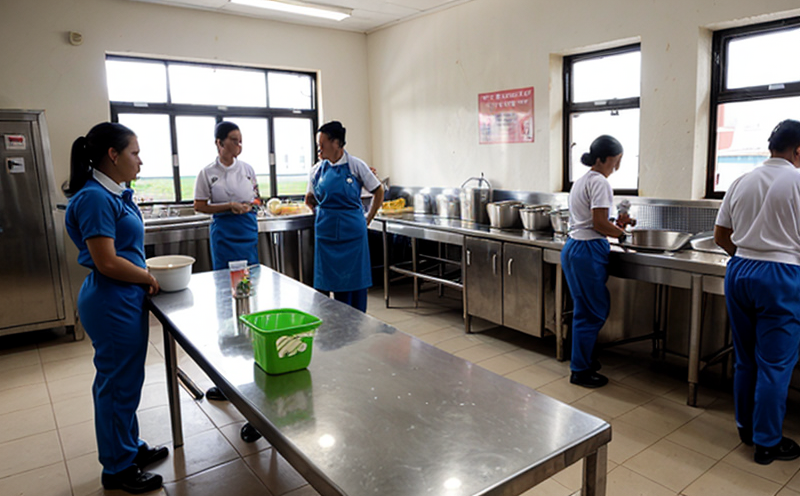Canteen hygiene inspection
The Canteen Hygiene Inspection is a critical component of Environmental Health and Safety (EHS) management. Ensuring that food preparation areas are clean, safe, and hygienic is essential for protecting the health and well-being of employees and visitors alike. This inspection goes beyond mere appearances; it encompasses a holistic evaluation of processes, facilities, and practices to ensure compliance with relevant standards and regulations.
The sector of Environmental Health and Safety (EHS) focuses on creating safe and healthy environments at work through policies, procedures, and programs. Canteen hygiene inspections are an integral part of this effort, ensuring that food safety protocols are followed meticulously. This includes the cleanliness of surfaces, utensils, and equipment; proper handling and storage of food items; and adherence to temperature controls during preparation.
The inspection process involves a systematic approach to evaluating various aspects of canteen operations. The first step is a visual assessment of the physical environment, including the cleanliness of workspaces, floors, walls, and fixtures. This is followed by an evaluation of kitchen equipment such as ovens, refrigerators, sinks, and dishwashers. Ensuring these are in good working order and maintained properly is crucial for preventing contamination.
Another important aspect is the hygiene practices of staff members involved in food preparation. Trained personnel who follow proper handwashing techniques, wear appropriate attire, and dispose of waste correctly contribute significantly to maintaining a hygienic environment. The inspection also covers the handling and storage of raw ingredients and prepared foods, ensuring they are protected from contamination.
The importance of accurate and reliable testing cannot be overstated in this context. Compliance with specific standards like ISO 22000 for food safety management systems or HACCP (Hazard Analysis and Critical Control Points) protocols is essential. These frameworks provide a structured approach to identifying potential hazards, implementing preventive measures, and continuously improving processes.
Regular inspections help identify areas where improvements are needed and ensure that all necessary controls are in place. This proactive stance helps prevent incidents of foodborne illness, which can have severe consequences for both individuals and organizations.
Why It Matters
The importance of canteen hygiene inspections cannot be overstated. In the realm of Environmental Health and Safety (EHS), these inspections play a pivotal role in safeguarding public health and ensuring compliance with regulatory requirements.
Maintains employee well-being: Ensures that food prepared in the canteen is safe to consume, thereby protecting staff from potential health risks.
Compliance with relevant standards like ISO 26000 on social responsibility and HACCP guidelines ensures adherence to best practices. This not only enhances reputation but also fosters trust among stakeholders.
Avoids legal repercussions: Non-compliance can lead to fines, legal actions, and damage to an organization's image. Regular inspections minimize such risks by identifying potential issues early on.
Additionally, these inspections contribute to a safer working environment, promoting productivity and job satisfaction among employees.
Applied Standards
| Standard Code | Description |
|---|---|
| ISO 22000:2018 | International standard for food safety management systems. |
| HACCP (Hazard Analysis and Critical Control Points) | A systematic approach to identifying, assessing, and controlling hazards in food production. |
| Framework | Description |
|---|---|
| Occupational Safety and Health Administration (OSHA) | Ensures safe working conditions for employees, including those in the canteen. |
| Food Standards Agency | Regulates food safety and hygiene practices across various sectors. |
Customer Impact and Satisfaction
Enhanced reputation: Clients appreciate an organization's commitment to high standards, leading to increased customer satisfaction.
Regular inspections lead to improvements in operational efficiency. This results in better resource management and reduced wastage.
Increased productivity: A clean and safe environment promotes a positive work culture, enhancing employee morale and performance.
Customers are reassured by the knowledge that their health is being protected against potential risks associated with foodborne illnesses.





